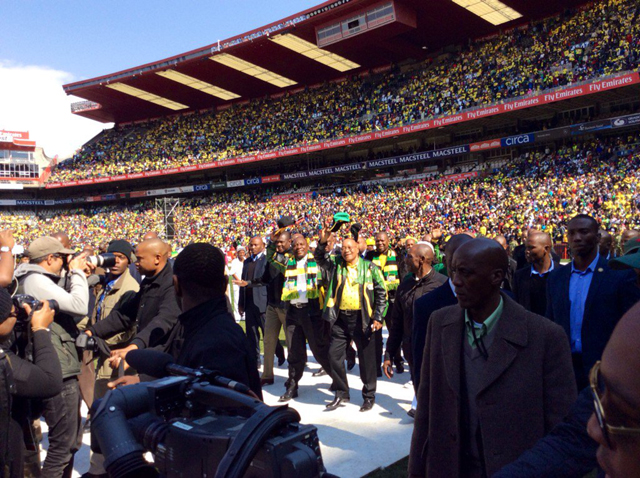
South Africans vote Wednesday in municipal elections widely seen as a referendum on President Jacob Zuma, with the stalling economy overshadowing progress made since the end of apartheid.
Zuma’s African National Congress (ANC), which controls the majority of the 278 municipalities, has been weakened by graft scandals and growing public discontent since it led the fight that ended white-minority rule in 1994.
The government struggle to provide basic services as such electricity to many of the poor could fuel support for the main opposition Democratic Alliance (DA) and the radical leftist Economic Freedom Fighters (EFF).
The ANC has easily won all post-apartheid elections, but its rivals hope this week’s vote could shake its previously impregnable hold on power.
Analysis of the results, expected to be released from late Wednesday, will focus on the battle for three key metropolitan municipalities — the capital Pretoria, the economic hub Johannesburg and the coastal city of Port Elizabeth.
Polls suggest the DA, which already holds Cape Town, could win all three cities, providing it with a major boost ahead of the 2019 general election.
“We are dealing with a situation of an angry electorate,” Prince Mashele of the Pretoria-based Centre for Politics and Research told AFP.
“For many people, the hope that came with the ANC has turned into disgruntlement.”
The August 3 poll will elect mayors and other local representatives responsible for the hot-button issues of water, sanitation and power supply.
Election violence
Problems providing such daily basics trigger regular and sometimes violent “service delivery” protests in South Africa, where harsh socio-economic divisions remain a grim legacy of the apartheid era.
Violence has also marred the election campaign itself, with a spate of politically-linked killings mainly in the eastern province of KwaZulu-Natal, an ANC stronghold.
At least 13 people have been killed in attacks often blamed on internal ANC friction.
A record 26.3 million people are registered to vote, but low turnout may be a factor more than two decades after the euphoric 1994 elections that brought the ANC and Nelson Mandela to office.
A poor showing by the ANC on Wednesday would pile pressure on Zuma, who could step down before his term ends when the national elections are held in three years’ time.
The party’s promise of more jobs has been unfulfilled thanks to the frail economy.
Growth is predicted to flatline at zero percent this year, leaving the stubbornly high unemployment rate at about 26 percent, with frustrated young job-seekers particularly badly affected.
“We are now entering an era where you cannot predict the outcome of the elections. This never used to be the case,” said Mashele.
“There is an element of unpredictability (that may) inject an element of accountability in the political system.”
In the last municipal vote in 2011, the ANC took Pretoria by 56 percent, while the DA garnered 39 percent.
A latest poll by Ipsos showed the DA ahead in Nelson Mandela Bay (Port Elizabeth), Tshwane (Pretoria) and Johannesburg.
A breakthrough moment?
The DA, previously seen as the party for middle-class whites, is running under its first black leader Mmusi Maimane, who hopes to vastly extend the party’s appeal.
The EFF, led by firebrand Julius Malema, is standing in its first municipal elections, and could emerge as a major player with its populist calls for land redistribution without compensation and nationalisation of the mines.
“The ANC may be in decline, but it still stands a chance of winning the election overall,” said Susan Booysen, a political analyst at the University of the Witwatersrand, urging caution over predicting the results.
“The ANC realises the difficult position it’s in, and has pulled all the stops to ensure that it retains the key metros.”
She added that recent violent protests were not necessarily a sign of rejection of the current government.
“Communities often use the protests as a way of communicating the ANC,” she said.
The party has roped in anti-apartheid stalwarts such as Winnie Madikizela-Mandela, former wife of Mandela, to urge people to vote for the liberation movement.
The DA has also regularly evoked Mandela’s name in its campaign, much to the ANC’s chagrin.
 The Independent Uganda: You get the Truth we Pay the Price
The Independent Uganda: You get the Truth we Pay the Price



